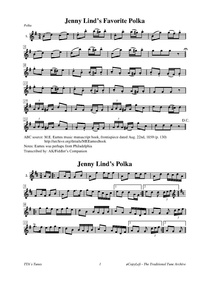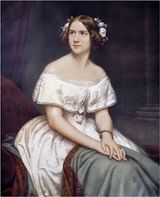Template:Pagina principale/Vetrina: Difference between revisions
No edit summary |
No edit summary |
||
| Line 1: | Line 1: | ||
{{SheetMusic | {{SheetMusic | ||
|f_track= | |f_track=Jenny Lind(1).mp3 | ||
|f_pdf= | |f_pdf=Jenny Lind's Polka.pdf | ||
|f_artwork= | |f_artwork=Lind.jpg | ||
|f_tune_name= | |f_tune_name=Jenny Lind | ||
|f_track_title= | |f_track_title=Jenny_Lind_(1) | ||
|f_section=abc | |f_section=abc | ||
|f_played_by=[https:// | |f_played_by=[https://soundcloud.com/hjst Hjst] | ||
|f_notes= | |f_notes= Jenny Lind (1820–1887) | ||
|f_caption= | |f_caption=Jenny Lind toured Europe during 1844–48 to much popular acclaim, and took London, then Dublin by storm in 1847 and 1848. P.T. Barnum promoted an American tour of the by then world-famous singer in 1851–52, and she played a 150 concerts at $1,000 a performance. | ||
|f_source=[https:// | |f_source=[https://soundcloud.com/hjst/jenny-lind Soundcloud] | ||
|f_pix=420 | |f_pix=420 | ||
|f_picpix=200 | |f_picpix=200 | ||
|f_article=[[ | |f_article=[[Jenny_Lind_(1) | '''Jenny Lind''']] | ||
The tune is almost universally known among older traditional fiddle and squeezebox players in England and morris dance versions have been collected from the Bampton area of England's Cotswolds (Mallinson), and North-West England (Wade) where it is used as a tune for a polka step. It was a hit of the late 20th century folk revival in England, its popularity spurred by Bill Leader, Reg Hall and Bob Davenport's influential recording "English Country Music" (1965), a limited release which featured Norfolk fiddler Walter Bulwer and his wife Daisy (piano), and Billy Cooper (hammered dulcimer). The recording became a collectors item until it was re-released on LP by Topic Records in 1976. | |||
" | |||
"Jenny Lind's Favorite Polka" was entered into the 1859 music copybook of American musician M.E. Eames (about whom, unfortunately, nothing is known). Tom Carter and Barry Poss say the tune has "only occasionally" been recorded in Virginia and West Virginia, sometimes under the title "[[Heel and Toe Polka]]," however, it appears in the repertory of many North Carolina Piedmont old-time musicians. | |||
"Jenny Lind Polka" ([[Sal with the Run Down Shoes]]) was in the repertoire of fiddler S.S. Ransdell (Louisburg, Granville, County, N.C.) who competed in 1905 in the Raleigh, N.C., fiddler's convention, as recorded by the old Raleigh News and Observer. The melody is mentioned in accounts (1926–31) as having been played at the De Kalb County (Alabama) Annual (Fiddlers') Convention (Cauthen, 1990), and also appears in a list of traditional Ozark Mountain fiddle tunes compiled by musicologist/folklorist Vance Randolph, published in 1954. | |||
John Summers played "Jenny Lind Polka" Jim Herd, living in Seattle but originally from the Ozarks, played an old-time variant he called "[[Dance All Night with a Gal with a Hole in Her Stocking]]" (merged with "[[Buffalo Gals]]"). An early recording on 78 RPM was by Henry Whitter's Breakdowners, from southwestern Virginia. North-central Kentucky fiddler Everett Kays' played a reel called "[[Jenny Lynn (2)]]" that is a very distanced version of "Jenny Lind (1)," noticeable in the second strain. | |||
}} | }} | ||
Revision as of 13:59, 29 January 2023

Played by: Hjst
Source: Soundcloud
Image: Jenny Lind (1820–1887)

The tune is almost universally known among older traditional fiddle and squeezebox players in England and morris dance versions have been collected from the Bampton area of England's Cotswolds (Mallinson), and North-West England (Wade) where it is used as a tune for a polka step. It was a hit of the late 20th century folk revival in England, its popularity spurred by Bill Leader, Reg Hall and Bob Davenport's influential recording "English Country Music" (1965), a limited release which featured Norfolk fiddler Walter Bulwer and his wife Daisy (piano), and Billy Cooper (hammered dulcimer). The recording became a collectors item until it was re-released on LP by Topic Records in 1976.
"Jenny Lind's Favorite Polka" was entered into the 1859 music copybook of American musician M.E. Eames (about whom, unfortunately, nothing is known). Tom Carter and Barry Poss say the tune has "only occasionally" been recorded in Virginia and West Virginia, sometimes under the title "Heel and Toe Polka," however, it appears in the repertory of many North Carolina Piedmont old-time musicians.
"Jenny Lind Polka" (Sal with the Run Down Shoes) was in the repertoire of fiddler S.S. Ransdell (Louisburg, Granville, County, N.C.) who competed in 1905 in the Raleigh, N.C., fiddler's convention, as recorded by the old Raleigh News and Observer. The melody is mentioned in accounts (1926–31) as having been played at the De Kalb County (Alabama) Annual (Fiddlers') Convention (Cauthen, 1990), and also appears in a list of traditional Ozark Mountain fiddle tunes compiled by musicologist/folklorist Vance Randolph, published in 1954.
John Summers played "Jenny Lind Polka" Jim Herd, living in Seattle but originally from the Ozarks, played an old-time variant he called "Dance All Night with a Gal with a Hole in Her Stocking" (merged with "Buffalo Gals"). An early recording on 78 RPM was by Henry Whitter's Breakdowners, from southwestern Virginia. North-central Kentucky fiddler Everett Kays' played a reel called "Jenny Lynn (2)" that is a very distanced version of "Jenny Lind (1)," noticeable in the second strain.
...more at: Jenny Lind - full Score(s) and Annotations
X:1 T:Jenny Lind's Favorite Polka M:2/4 L:1/8 R:Polka S:M.E. Eames music manuscript book, frontispiece dated Aug. 22nd, 1859 (p. 130) S:http://archive.org/details/MEEamesBook N:Eames was perhaps from Philadelphia Z:AK/Fiddler's Companion K:G V:1 clef=treble name="1." [V:1] (Bd) (ce)|.d.b (b/^a/).b|.c.a (a/^g/).a|(Bg) (g/f/).g| (Bd) (ce)|(db) (b/^a/).b|(ca) (a/^g/).a|ggg z!fermata!|| .g.e (e/^d/)e|.d.B (B/^A/).B|.c.A (A/^G/).A|.B.G (G/F/).G| .g.e (e/^d/).e|.d.B (B/^A/).B|.c.A (A/^G/).A|GGG z| (3A/B/A/ ^G/A/ dF|AG (G/F/)G|(3A/B/A/ ^G/A/ gc|ed (d/^c/)d| (3A/B/A/ ^G/A/ dF|.A.G (G/F/)G|(3A/B/A/ (^G/A/) gc|ddd z!D.C.!||
